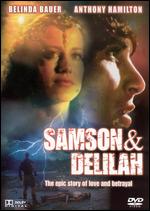| Samson and Delilah | |
|---|---|
 DVD cover | |
| Genre | Adventure Fantasy Action |
| Based on | Husband of Delilah by Eric Linklater |
| Written by | John Gay |
| Directed by | Lee Philips |
| Starring | Max von Sydow Belinda Bauer Antony Hamilton Daniel Stern Victor Mature |
| Music by | Maurice Jarre |
| Country of origin | United States |
| Original language | English |
| Production | |
| Executive producer | Gregory Harrison |
| Producer | Franklin R. Levy |
| Cinematography | Gerry Fisher |
| Editor | George Jay Nicholson |
| Running time | 95 minutes |
| Production company | Catalina Productions |
| Original release | |
| Network | ABC |
| Release | April 1, 1984 |
Samson and Delilah is a 1984 television film adaptation of the biblical story of Samson and Delilah directed by Lee Philips and starring Max von Sydow, Belinda Bauer, Antony Hamilton, Daniel Stern and Victor Mature. Mature played Samson in the 1949 film and had a small cameo as the father of Antony Hamilton's Samson. This was his final acting role. Based on the 1962 novel Husband of Delilah by Eric Linklater, Samson and Delilah originally aired on ABC.
